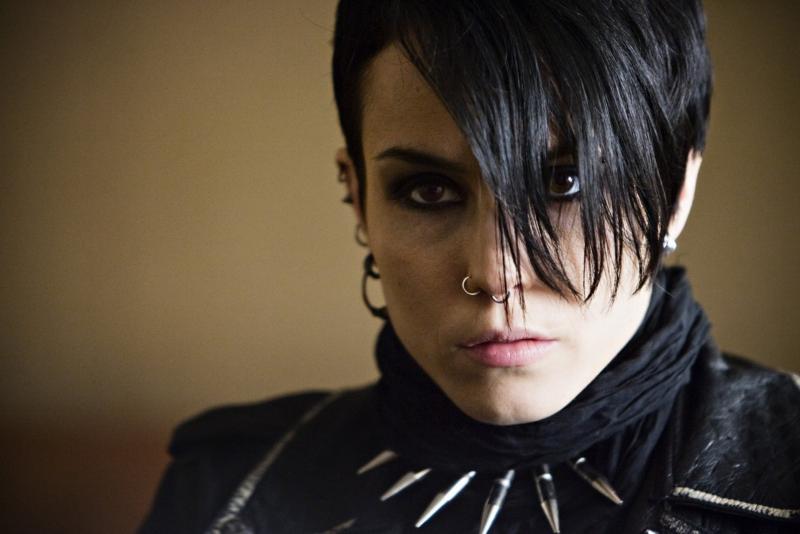The Girl with the Dragon Tattoo | reviews, news & interviews
The Girl with the Dragon Tattoo
The Girl with the Dragon Tattoo
Ill-met sleuths in the first instalment of Stieg Larsson's cult Millennium trilogy

When roused, Lisbeth Salander (Noomi Rapace), the sullen, leather-clad, metal-pierced heroine ofThe Girl With the Dragon Tattoo, is as ferocious as the panther her physical presence evokes.
It’ll be curious to see if the planned Hollywood version of this Swedish box-office phenomenon balks at such a graphic Old Testament revenge scenario, which serves to establish Lisbeth’s resourcefulness and take-no-shit attitude but is otherwise incidental to the main plot of Niels Arden Oplev’s thriller. This concerns a financial journalist, Mikael Blomkvist (Michael Nyqvist), who at the outset is sentenced to a short prison sentence six months hence after losing a libel case against a corrupt multinational. When he’s approached by retired industrialist Henrik Vanger to find out what became of Vanger’s beloved 16-year-old niece, who went missing 40 years before, Blomkvist takes the job and heads to the Vanger clan’s island enclave. Nazism is one of the skeletons he finds rattling around in the family closets.
Initially, Opley intercuts between Blomkvist’s investigation and the travails of Lisbeth - the brilliant computer hacker who convinced Vanger’s right-hand man to hire Blomqvist - then unites the urbane journalist and the violent punkette as a pair of ill-met sleuths. Though we’re led to believe she’s a lesbian, it’s only a matter of time before she’s straddling him in bed in the middle of the night. Their affair robs the movie of a more subtle father-daughter relationship, especially since we learn that the psychologically damaged Lisbeth torched her abusive dad when she was a child.
 Nyqvist, 49, and Rapace, 30, who won the Swedish Oscar for best actress for her gutsy performance, are nonetheless good company, and they’ve repeated their roles in The Girl Who Played With Fire and The Girl Who Kicked the Hornet’s Nest, which were directed by Daniel Alfredson (the actors are pictured right). The films are based on the posthumously published, best-selling Millennium trilogy by Stieg Larsson (1954-2004), himself a Blomqvist-like journalist who fought extreme right-wing and Nazi organizations. He conceived Lisbeth as a grown-up version of Pippi Longstocking, the morally righteous nine-year-old Swedish adventuress.
Nyqvist, 49, and Rapace, 30, who won the Swedish Oscar for best actress for her gutsy performance, are nonetheless good company, and they’ve repeated their roles in The Girl Who Played With Fire and The Girl Who Kicked the Hornet’s Nest, which were directed by Daniel Alfredson (the actors are pictured right). The films are based on the posthumously published, best-selling Millennium trilogy by Stieg Larsson (1954-2004), himself a Blomqvist-like journalist who fought extreme right-wing and Nazi organizations. He conceived Lisbeth as a grown-up version of Pippi Longstocking, the morally righteous nine-year-old Swedish adventuress.
In The Girl With the Dragon Tattoo, blown-up photographs of the niece spooked by someone looking at her in a crowd on the day she disappeared eventually put Blomkvist and Lisbeth on the trail of a bi-generational worth of serial killings of women all over Sweden. Abhorrence of violence against women is a major tenet of the Millennium books, but the first movie in the series - known as Men Who Hate Women in Sweden - is scarcely a feminist tract. In frankly depicting Lisbeth’s rapes and presenting an obscene array of photographs of murdered women in a killer’s lair, it comes across as glibly indulgent of those visual horrors.
The Danish director of Portland (1996) and We Shall Overcome (2006), Oplev makes expressive use of dissolves and a wintry palette with many shades of gray. The film is drained not only of colour, however, but tension too, which can make its two and a half hours seem protracted. The lack of gravitas and ominousness germane to the Red Riding Trilogy, say, borders on the bizarre: one comes away having been entertained, but scarcely as thrilled or chilled as Jacob Groth’s melodramatic score demands. Martin Scorsese, Quentin Tarantino and Ridley Scott have reportedly professed interest in directing the American adaptation, to be written by Steve Zaillian (also on board for Scott’s Red Riding remake), but perhaps it needs Kathryn Bigelow in Blue Steel mode to realize Lisbeth’s white-hot feminine fury States-side.
Explore topics
Share this article
Add comment
The future of Arts Journalism
You can stop theartsdesk.com closing!
We urgently need financing to survive. Our fundraising drive has thus far raised £49,000 but we need to reach £100,000 or we will be forced to close. Please contribute here: https://gofund.me/c3f6033d
And if you can forward this information to anyone who might assist, we’d be grateful.

Subscribe to theartsdesk.com
Thank you for continuing to read our work on theartsdesk.com. For unlimited access to every article in its entirety, including our archive of more than 15,000 pieces, we're asking for £5 per month or £40 per year. We feel it's a very good deal, and hope you do too.
To take a subscription now simply click here.
And if you're looking for that extra gift for a friend or family member, why not treat them to a theartsdesk.com gift subscription?
more Film
 Blu-ray: Finis Terrae
Bleak but compelling semi-documentary, filmed on location in Brittany
Blu-ray: Finis Terrae
Bleak but compelling semi-documentary, filmed on location in Brittany
 Oslo Stories Trilogy: Sex review - sexual identity slips, hurts and heals
A quietly visionary series concludes with two chimney sweeps' awkward sexual liberation
Oslo Stories Trilogy: Sex review - sexual identity slips, hurts and heals
A quietly visionary series concludes with two chimney sweeps' awkward sexual liberation
 Sorry, Baby review - the healing power of friendship in the aftermath of sexual assault
Eva Victor writes, directs and stars in their endearing debut feature
Sorry, Baby review - the healing power of friendship in the aftermath of sexual assault
Eva Victor writes, directs and stars in their endearing debut feature
 Blu-ray: Who Wants to Kill Jessie?
Fast-paced and visually inventive Czech comedy
Blu-ray: Who Wants to Kill Jessie?
Fast-paced and visually inventive Czech comedy
 Oslo Stories Trilogy: Love review - freed love
Gay cruising offers straight female lessons in a heady ode to urban connection
Oslo Stories Trilogy: Love review - freed love
Gay cruising offers straight female lessons in a heady ode to urban connection
 Beating Hearts review - kiss kiss, slam slam
Romance and clobberings in a so-so French melodrama
Beating Hearts review - kiss kiss, slam slam
Romance and clobberings in a so-so French melodrama
 Materialists review - a misfiring romcom or an undercooked satire?
Writer-director Celine Song's latest can't decide what kind of film it is
Materialists review - a misfiring romcom or an undercooked satire?
Writer-director Celine Song's latest can't decide what kind of film it is
 theartsdesk Q&A: actor Leonie Benesch on playing an overburdened nurse in the Swiss drama 'Late Shift'
The Guildhall-trained German star talks about the enormous pressures placed on nurses and her admiration for British films and TV
theartsdesk Q&A: actor Leonie Benesch on playing an overburdened nurse in the Swiss drama 'Late Shift'
The Guildhall-trained German star talks about the enormous pressures placed on nurses and her admiration for British films and TV
 Freakier Friday review - body-swapping gone ballistic
Lindsay Lohan and Jamie Lee Curtis's comedy sequel jumbles up more than their daughter-mother duo
Freakier Friday review - body-swapping gone ballistic
Lindsay Lohan and Jamie Lee Curtis's comedy sequel jumbles up more than their daughter-mother duo
 Eight Postcards from Utopia review - ads from the era when 1990s Romania embraced capitalism
Radu Jude's documentary is a mad montage of cheesy TV commercials
Eight Postcards from Utopia review - ads from the era when 1990s Romania embraced capitalism
Radu Jude's documentary is a mad montage of cheesy TV commercials
 The Kingdom review - coming of age as the body count rises
A teen belatedly bonds with her mysterious dad in an unflinching Corsican mob drama
The Kingdom review - coming of age as the body count rises
A teen belatedly bonds with her mysterious dad in an unflinching Corsican mob drama

Comments
...